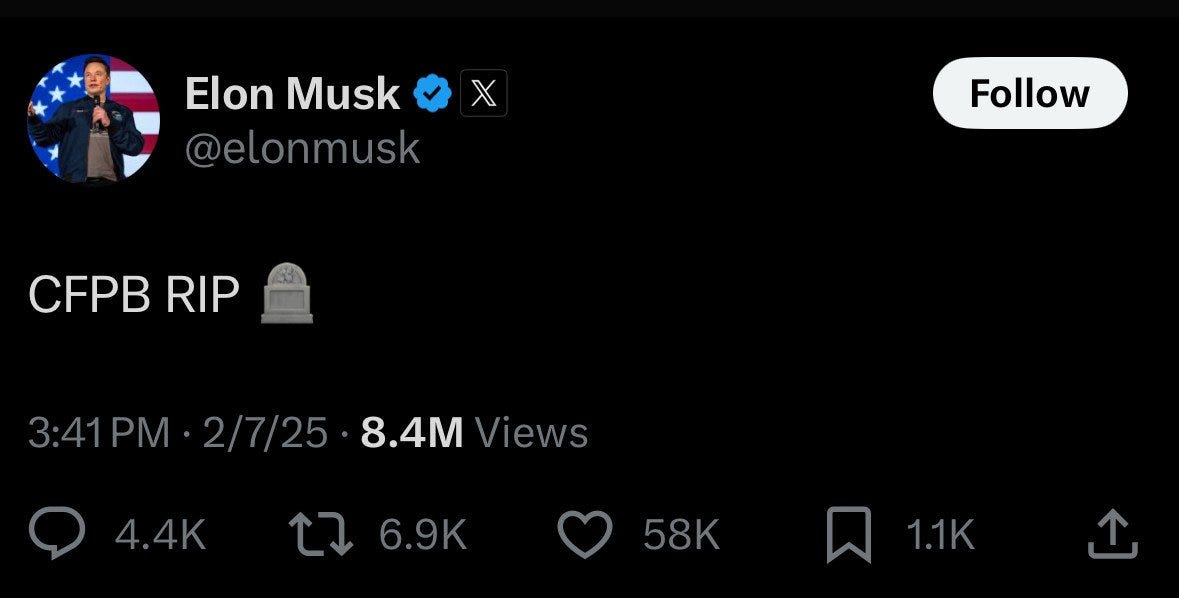A medical-debt watchdog gets sidelined: Now what?
Reading time: 4 min, 30 seconds

Elon Musk on Ex-Twitter two days before staff at the CFPB received a stop-work order.
Hey, Dan here.1
Among all the Trump Administration’s many sudden moves, we’ve been closely watching one story: Efforts to bench an agency called the Consumer Financial Protection Bureau (CFPB for short).
The CFPB enforces federal laws that protect people from shady practices by financial institutions and bill collectors.
Very much including medical-bill collectors.
Last week’s Arm and a Leg podcast looked at some consequences of kneecapping the CFPB. I talked with credit counselor Lara Ceccarelli, who spends her days helping people with bills they can’t pay — including medical bills.
For years, whenever Lara’s talked to a client, and it sounds like a debt collector is violating their rights — which happens a lot — she has referred the client to the CFPB.
“It makes a difference feeling like you’ve got a powerhouse at your back,” she told me.
So in early February, when she saw news reports that CFPB employees were told to stop working, she felt sick to her stomach.
We’ll break down why the CFPB has been so important for Lara — and for tens of millions of people with medical debt — and what we’ve learned since that episode came out.

CFPB Consumer Financial Protection Bureau entrance Washington DC 2025-02-10 11-14-45 by G. Edward Johnson is licensed under CC BY 4.0.
The CFPB and medical debt
After the 2008 financial crisis, Congress created the CFPB as a serious watchdog2, with authority to file lawsuits, cancel debts, issue fines, force companies to return money to consumers — and even shut companies down, like a medical-bill collections agency the CFPB shuttered in 2023. Since it started operating, the agency says it’s put $21 billion back in the pockets of consumers.
That’s the “powerhouse” Lara Ceccarelli described. According to the agency’s website, people who file complaints typically get a response within 15 days.
Even the threat of new CFPB rules can spur changes. Under the Biden Administration, the CFPB started looking at whether medical bills belong on credit reports: As lots of folks have pointed out, getting hit with a medical bill you can’t pay is very different from running up a credit card bill for, say, a vacation you can’t afford.
In May 2022, the credit bureaus announced some “voluntary” changes, including: medical bills under $500 would be removed from their reports.3
I first talked to Lara then, to ask her if those changes would be meaningful, and she said it would be huge.4
Now, more than two years in, Lara tells me her predictions came true. Before those changes, “I used to have at least one conversation about medical debt a day,” she said. “Usually more.” Now it’s more like one or two a week.
Biden’s CFPB took a parting shot at medical debts: In January, it finalized new rules barring all medical debt from credit reports.
The rule would help 15 million people, who owe a combined $49 billion in medical debts, the agency estimated.
It was slated to take effect this month. Then…
The CFPB in limbo
On February 9, CFPB staff got a memo telling them to stop working, effective immediately.
Over the next few days, the bureau shuttered its headquarters, laid off more than 150 workers, and cancelled over $100 million in contracts. Mass firings were said to be imminent.
For now, they’re on hold, thanks to a federal court. On February 13, unions representing the bureau’s workers sued, joined by nonprofits like the National Consumer Law Center.
The next day, Judge Amy Berman Jackson, issued a temporary order: No more mass layoffs, no more cancelling contracts, no destroying data — or removing data from public websites — and no returning funds to Congress.
That’s where things stood when we published the podcast last week. Monday of this week, March 3, Judge Jackson held a hearing on the CFPB.
Agency officials claimed they weren’t really shutting down the agency, just “right-sizing” it.
Jackson was unconvinced, given that most CFPB staff remain on administrative leave.
“We can’t have edicts issued with people’s fingers crossed behind their backs,” she told Trump administration lawyers.5 She ordered the agency’s COO to appear at a hearing next Monday, March 10, under oath.
Until then, she extended her prohibitions on mass firings and data destruction, “to make sure [the CFPB] hasn’t been choked out of existence before I get to rule.”
Meanwhile, just in the last week or so, the CFPB has pulled out of more than half a dozen cases against financial institutions, including a $2 billion suit against Capital One Bank.
It’s a lot.
OK, so without the CFPB, where can you get help dealing with debt collectors?
Lara Ceccarelli says “the lights are still on” at the nonprofit credit-counseling agency6 where she works. Here’s what she’s telling clients now:
-
Look to your state government. In some states, the attorney general’s office does a lot of consumer-rights enforcement. Some states also have stand-alone consumer protection bureaus, and nine have already banned medical debt from credit reports, Find a link to yours here.7
Some states may move to beef up their consumer-protection laws with the CFPB on ice. Under Biden, the agency put out a guide on actions states can take. -
Sometimes, maybe, the Federal Trade Commission can help? Lara says the FTC has the power to enforce an important law regulating what debt collectors can and can’t do called the Fair Debt Collection Practices Act. They’re not specialists, but for now, the FTC seems to be operational. You can file a complaint here.
-
Know your rights, and how to speak up for them. A few years ago, a North Carolina mom blew up on TikTok with advice for how to talk to debt collectors. We profiled her on the podcast, and in a separate episode, ran her advice past a veteran consumer-protection lawyer, who gave it a thumbs-up. We’ve been meaning to write up her tips ever since for First Aid Kit, and we’ll get around to it (soon, I hope).
OK, that’s a lot!
Claire’s back next week, with Chapter 2 in the saga of her project to help her roommate push back against $14,500 in medical bills.
Till then, take care of yourself.
— Dan
We’re interrupting the saga we started here in First Aid Kit last week — my colleague Claire’s project helping her roommate Margot fight off $14,500 in medical bills. More on that next week!
Previously, several different federal agencies split up the job of enforcing consumer-protection laws.
Other changes included waiting until larger medical debts were at least a year old before listing them on credit reports, giving patients more time to contest erroneous bills or insurance-company denials.
The CFPB estimated that 60 percent of medical bills on credit reports were for amounts below $500.
There’s a list of agencies like this at the Department of Justice website. Which, hm. Federal websites and their data seem in danger of getting pulled. Maybe somebody should make a copy of this one?
Hm. Another federal website. Seriously, is anybody around here an archivist?
Get the First Aid Kit Newsletter!
First Aid Kit
Get our latest tips for dealing with the healthcare-industrial complex.

